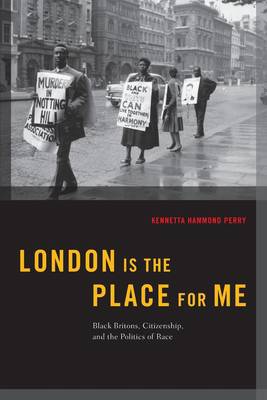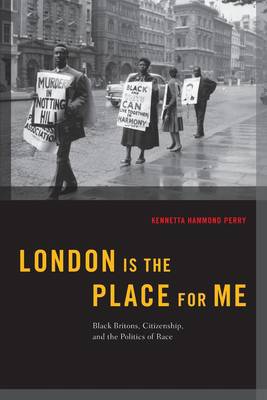
Door een staking bij bpost kan je online bestelling op dit moment iets langer onderweg zijn dan voorzien. Dringend iets nodig? Onze winkels ontvangen jou met open armen!
- Afhalen na 1 uur in een winkel met voorraad
- Gratis thuislevering in België vanaf € 30
- Ruim aanbod met 7 miljoen producten
Door een staking bij bpost kan je online bestelling op dit moment iets langer onderweg zijn dan voorzien. Dringend iets nodig? Onze winkels ontvangen jou met open armen!
- Afhalen na 1 uur in een winkel met voorraad
- Gratis thuislevering in België vanaf € 30
- Ruim aanbod met 7 miljoen producten
Zoeken
London Is the Place for Me
Black Britons, Citizenship and the Politics of Race
Kennetta Hammond Perry
€ 72,45
+ 144 punten
Uitvoering
Omschrijving
Black people in the British Empire have long challenged the notion that "there ain't no black in the Union Jack." For the post-World War II wave of Afro-Caribbean migrants, many of whom had long been subjects of the Empire, claims to a British identity and imperial citizenship were considered to be theirs by birthright. However, while Britain was internationally touted as a paragon of fair play and equal justice, they arrived in a nation that was frequently hostile and unwilling to incorporate Black people into its concept of what it meant to be British. In London Is The Place for Me, Kennetta Hammond Perry brings together a variety of sources including calypso music, photographs, migrant narratives, and records of grassroots Black political organizations to explores how Afro-Caribbean migrants navigated the politics of race and citizenship in Britain. Her examination expands our understanding of race and the Black experience in Europe and uncovers the critical role that Black people played in the formation of contemporary British society.
Specificaties
Betrokkenen
- Auteur(s):
- Uitgeverij:
Inhoud
- Aantal bladzijden:
- 336
- Taal:
- Engels
- Reeks:
Eigenschappen
- Productcode (EAN):
- 9780190909949
- Verschijningsdatum:
- 1/09/2018
- Uitvoering:
- Paperback
- Formaat:
- Trade paperback (VS)
- Afmetingen:
- 155 mm x 231 mm
- Gewicht:
- 544 g

Alleen bij Standaard Boekhandel
+ 144 punten op je klantenkaart van Standaard Boekhandel
Beoordelingen
We publiceren alleen reviews die voldoen aan de voorwaarden voor reviews. Bekijk onze voorwaarden voor reviews.











